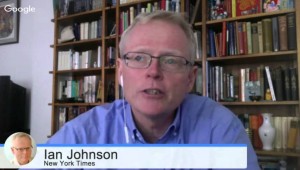
China’s central government has been cracking down on both Protestantism and the Islam over the past year. The direct future looks grim, says journalist Ian Johnson, author of The Souls of China: The Return of Religion After Mao at Foreign Affairs in an addition to a piece he wrote two years ago. The government can still go back to its pragmatic take on religion, but Johnson is not sure it will.
Ian Johnson
This need not happen. If the state steps back and takes a deep breath, it could avoid the conflicts that its current policies seem bound to create. One has only to think of the years of protest caused by the crackdown on Falun Gong to get an idea of how banning even one sect can become a messy, protracted affair. House churches have also been equally stubborn—just banning the Shouwang Church in Beijing in 2009 resulted in years of protests. And the inevitable backlash against such misguided policies as forcing Muslims to eat pork and drink alcohol is scarcely imaginable.
Up until now, I’ve always believed in the pragmatism of China’s reform-era leadership, despite the brutality of many measures taken during that period. Yet China is no longer in the reform era. Instead, it is entering a new period, one that may make observers look back fondly on the relatively light touch of the country’s past leaders.
Ian Johnson is a speaker at the China Speakers Bureau. Do you need him at your meeting or conference? Do get in touch or fill in our speakers’ request form.
Are you looking for more political experts at the China Speakers Bureau? Do check out this list.
